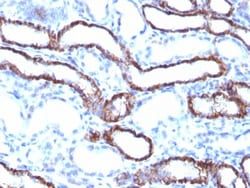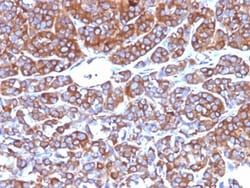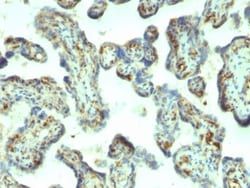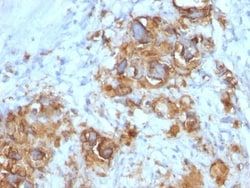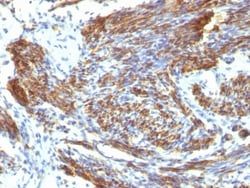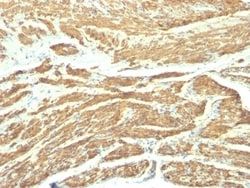Cadherin-16 Antibody (CDH16/1071), Novus Biologicals™
Mouse Monoclonal Antibody has been used in 2 publications
Manufacturer: Fischer Scientific
The price for this product is unavailable. Please request a quote
Antigen
Cadherin-16
Concentration
0.2mg/mL
Applications
Flow Cytometry, Immunohistochemistry (Paraffin), Immunofluorescence
Conjugate
Unconjugated
Host Species
Mouse
Target Species
Human, Mouse, Rat, Canine, Rabbit
Gene Accession No.
O75309
Gene ID (Entrez)
1014
Immunogen
Recombinant human CDH16 protein
Primary or Secondary
Primary
Content And Storage
Store at 4C.
Molecular Weight of Antigen
130 kDa
Clone
CDH16/1071
Dilution
Flow Cytometry 0.5 - 1 ug/million cells in 0.1 ml, Immunohistochemistry-Paraffin 0.5 - 1.0 ug/ml, Immunofluorescence 1 - 2 ug/ml
Classification
Monoclonal
Form
Purified
Regulatory Status
RUO
Formulation
10mM PBS and 0.05% BSA with 0.05% Sodium Azide
Gene Alias
cadherin 16, KSP-cadherin, cadherin-16, Kidney-specific cadherin, KSP-cadherin
Gene Symbols
CDH16
Isotype
IgG1 κ
Purification Method
Protein A or G purified
Test Specificity
This MAb recognizes a protein of 130kDa, identified as Ksp-cadherin. Cadherins form a superfamily of related glycoproteins that mediate calcium-dependent cell adhesion and transmit signals from the extracellular matrix to the cytoplasm. Cadherins have been implicated in embryogenesis, tissue morphogenesis, tissue structure maintenance, cell polarization, neoplastic invasiveness and metastasis, and membrane transport. It is suggested that Ksp-cadherin is a marker for terminal differentiation of the basolateral membranes of renal tubular epithelial cells. Within the kidney, Ksp-Cadherin is found exclusively in the basolateral membrane of renal tubular epithelial cells and collecting duct cells, and not in glomeruli, renal interstitial cells, or blood vessels.Ksp-Cadherin has been suggested to distinguish Chromophobe Renal-Cell Carcinoma from Oncocytoma.
Description
- Ensure accurate, reproducible results in Flow Cytometry, Immunohistochemistry (Paraffin), Immunofluorescence Cadherin-16 Monoclonal specifically detects Cadherin-16 in Human, Mouse, Rat, Canine, Rabbit samples
- It is validated for Western Blot, Flow Cytometry, ELISA, Immunohistochemistry, Immunohistochemistry-Paraffin.

